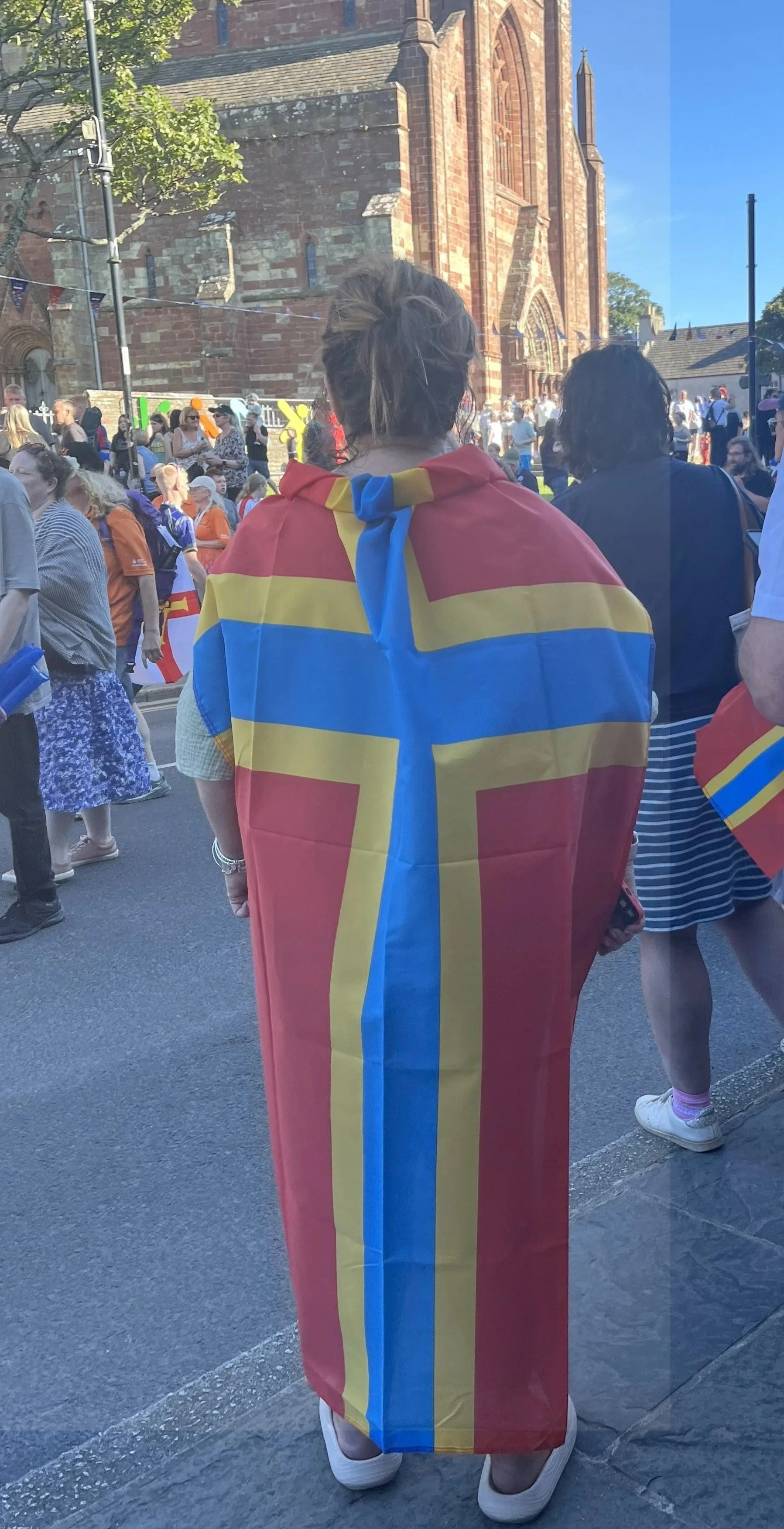Diary of a Shopkeeper, 20th July
Ynys Môn v Jersey women’s football
‘O wad some Pow'r the giftie gie us,’ wrote Robert Burns, ‘To see oursels as ithers see us! It wad frae mony a blunder free us, An' foolish notion.’
We’ve had several thousand opportunities to find out how ‘ithers see us’ this past week, from all the competitors, officials and supporters visiting for the Island Games. To be honest, they’ve probably been too busy immersed in the sport and basking in the sun to give considered opinions about Orkney. (The ferlie on a lady’s bonnet Burns addressed didn’t say much either.) The conversations I’ve had in the shop with Games visitors have not been plentiful, but the folk I’ve talked to have been very friendly and interesting. There’s much we all have in common, despite differences of geography, climate, population size and political status. I’ve particularly enjoyed learning more about the last of these.
The Falkland Islands are a British Overseas Territory, for instance, making their own decisions about internal politics, but covered by the UK’s foreign and defence policies. They have a population of just under 4,000.
Saaremaa, on the other hand, is straightforwardly a part of Estonia, with a population of 30,000, just as Gozo is part of Malta, and Hitra and Froya parts of Norway.
Greenland is the largest island in the world, though with a population close to that of Orkney and Shetland combined. Despite Donald Trump’s ‘foolish notion’ of taking it over, it remains an autonomous territory of Denmark, with the scope of its self-government increasing gradually in recent decades.
The status of some of the other islands represented with the games is even more complicated. The Isle of Man, for Instance, so close to the south-west coast Scotland, but not part of it. Rather, it’s a self-governing British Crown Dependency, controlling almost everything from tax to law – though with a Lieutenant Governor keeping an eye on things on behalf of the Lord of Mann, AKA King Charles.
Åland’s status is even stranger to our eyes. It’s an autonomous part of Finland, yet Swedish is the official language, stipulated in the Act that established its semi-independence in 1920. For centuries the archipelago – not one island, but about 70 inhabited islands and hundreds of small skerries – was part of Sweden, before Finland took it over, while Finland itself was claimed as part of the expanding Russian Empire. (Another echo with present politics.) After the tumult of World War One and the Russian Revolution, Finland gained its independence from Russia, and Ålanders debated whether they should be part of their historic nation, Sweden, or the geographically closer Finland. The League of Nations decided in Finland’s favour, with the condition that Swedish would remain the official language, that the unique local culture would be respected, and that a large amount of political autonomy would be ensured. (It’s amazing what you can learn from an Åland swimmer you bump into in Broad Street!)
What’s demonstrated by even a cursory glance at the political arrangements enjoyed by the two dozen islands involved in the Games is that there are nearly as many varieties of self-government as there are islands. The way in which we in Orkney control our own affairs is far from universal. We have much in common with everyone who has visited for the games, but in terms of political autonomy and self-governance we are – along with Shetland, the Western Isles, and the Norwegian islands – rather an outlier, with less autonomy than most comparable islands.
Orkney Islands Council last month finished its two-year examination into possible changes to the county’s governance, initiated by James Stockan. The BBC reported, ‘When the report he set in motion finally appeared before councillors, its conclusion that Orkney had no realistic prospect of changing its relationship with the UK was accepted without comment.’ ‘Without comment’ is an anticlimactic end to a process that started in 2023 with high hopes accompanied by a flurry of frankly ridiculous national media coverage. Is this how it all ends: not with a bang, and not even with a whimper? It seems so.
Yet, apart from the amazing sporting achievements of the Games week, and apart from the demonstration of what can be achieved through cooperation and community involvement, we can take away the knowledge that island groups the world over manage their affairs in many different ways. Some of them might even be better than the ways we currently manage ours, and free us from ‘mony a blunder.’
This diary appeared in The Orcadian on 24th July 2025. A new diary appears weekly. I post them in this blog a few days after each newspaper appearance, with added illustrations, and occasional small corrections or additions.


